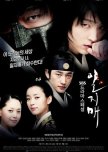
Questa recensione può contenere spoiler
'Iljimae' has left me sitting in a puddle of my own (hypothetical) tears. Although the first 6 episodes are a bit slow, the story soon picks up with a quick-fire, rapid pace that will leave your heart feeling as if it had been pulled out and stamped upon. It was truly a beautiful drama.The story is similar to Robin Hood, but it's more sophisticated, powerful, moving and gritty than the traditional English folk tale. It is, without giving anything way, a revenge story. However, unlike most revenge stories, it has a heart. Our hero isn't some morally conflicted guy who can't tell right from wrong - in fact, the drama does well by clearly defining the hero's morals and making sure that he never strays too far away from them. It is beautiful to watch the story unfold and see our hero grow.
The father/son relationship was also incredibly moving. You can tell that Seo Dol has this completely unconditional love for Yong (despite him not being his biological son), and their relationship is so special and beautiful. I haven't seen a father/son relationship, like that, in K-Drama - ever. The impact Seo Dol and Yong have on each other just pulls on my heartstrings, and I am usually a person who remains highly unmoved by fiction.
I also have a lot of admiration for Yong's adoptive mother Dan-ee. She appears to be cold and indifferent towards both Seo Dol and Yong (and even her own biological son, Ja Dol/Shi Hoo), but that's just way of trying to protect herself if anything bad happened to either of them. You can tell that she truly loves them.
Overall, the story was very good; however, the romantic aspect of the plot really did weigh it down. I saw no true purpose, asides from being a romantic tool, for Eun Chae; yes, she was caring, kind and seemingly selfless (well, at least that is what she liked to think) but her character lacked development, depth and heart. Every time she would pop up on screen, the story would end up slowing down. She was an unnecessary character, in my opinion, and her romance with Iljimae was highly unconvincing. The second main girl - who actually had a more significant impact, and had a purpose in the story - had much more convincing chemistry with Yong and I would have preferred her to be his primary love interest. She was a brilliant 3-dimensional character - like Yoong - and she had true depth.
I didn't have a problem with Ja Do/Shi Hoo, though. I thought it was kind of weird how he loved Eun Chae (not a spoiler, this is pretty much obvious from the outset of the drama) because he believed her to be his sister, although she wasn't (again, not a spoiler), so that incest-but-not-incest thing kind of grossed me off him for a while. However, his moral conflicts and his struggles with his identity were quite touching, and although he didn't have the same impact as Yoong, I did sympathise with him a lot.
The drama does not suffer from bad acting at all. The cast fully suited their roles, and although Lee Jun-ki is partial to some overacting, it wasn't anything that detracted away from the drama. The actor who played Seo Dol was amazing - that guy put me through emotional highs and lows, and he had amazing chemistry with Lee Jun-ki. I actually felt like I was watching a father/son team whenever those two were on screen with each other.
The best performances, in my opinion, came from Lee Moon Shik, Lee Yong Ah, Lee Jun Ki and Kim Sung Ryung, Lee Won Jong (who was perfect as the delightfully self-serving and wicked, Byun Shik) and Park Shi Hoo. There wasn't really anything that I could call a 'bad performance' in the drama, and though I didn't like Eun Chae, Han Hyo Joo did what she could with such a bland character.
The only reason why this drama doesn't get a perfect 10 from me is because I felt that the romance did actually weigh things down quite a bit and whilst the ending was good, the slight openness of it did irk me off because I prefer more defined endings. (Especially after watching a drama for 20 hours!) However, it was a beautiful story with beautiful characters (and great action scenes) and I recommend it to all. It has heart, humour and depth and it has really perked an interest in the saeguk genre, for me.
Questa recensione ti è stata utile?
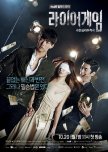
...which was bloody fantastic. 'Liar Game' is the third drama I've given a ten to, in the short amount of time I've been watching dramas, and out of those three dramas it is both the one I believe to be the best and the one that I enjoyed the most. Ten doesn't mean that I found it to be perfect (as perfection is unattainable), but since it has superseded many of the dramas that I've watched - both quality and entertainment wise - I thought it justifiably deserved the highest possible score.
'Liar Game' thrilled me, played with me, kept me guessing and sent my blood pressure rising in the best possible ways. The pacing was on beat and the tightly plotted 12 episodes managed to sail by without the assistance of makjang, noble idiocy, sacrificial lambs or filler. When I say that there was none of that present in 'Liar Game' I mean that there was absolutely zilch, nada, zero traces of any of the aforementioned tropes. The show was able to stand on its own two legs without relying on ridiculousness.
It presented a study of human behaviour - how we react and change (for better or worse) when it comes to trust. I don't see it as being a drama that is about how far people will go when it comes to money. Of course, in the context of the game, money is important, but 'Liar Game' teaches us that humans - people - are more important. It is people that make the choice to lie, cheat, betray and thus put others at risk - not money. Money is just the pretext, 'Liar Game' (both the drama and the game itself) is about all about people and how strong their characters are. It is also people who choose to watch others being pitted against each other, for money, to get an ounce of their weekly entertainment.
The games itself in 'Liar Game' were actually very intelligent and intricate. It might have been a bit boring to watch the explanations and rules of each round, but without them it would be difficult for some people to understand whatever the hell was going on. (The rules were useful when it came to the Poker round because wtf was going on there). Some people have said that they found the games 'boring', but that's besides the point, the interest doesn't lie within the games themselves, but within how the contestants survive the games. Each round served as a perfect backdrop for the deceit and breakdowns that were to follow.
The people in 'Liar Game' were of a brilliant variety. Not much time was spent on backstory (which was both refreshing and appreciated given the 12 episode length of the drama), but I managed to ascertain the personalities, motives and regrets of not just the three leads, but the principle supporting cast as well (Jamie, Ja Dol etc). And that is because LG had both a brilliant writer and a brilliant cast. These people grew into either more beautiful or more hateful as the machinations of the Liar Game got to them. I must add that this drama did really well by breaking the K-Drama trope of a woman being evil if she wears heavy make-up - more specifically, the darker the lipstick the darker her soul. It was excellent to see Jamie retain her grit, intelligence and vampyness whilst also being transformed into a person who has opened herself to being able to trust the right people.
A lot of people have said that Kim So-eun's character - NAM DA JUNG - was annoying because she was too stupid and remained stupid. I beg to differ on that topic; whilst Da Jung is most definitely too trusting and naive - AT THE BEGINNING - she most definitely does mature. Yes, she still trust, and yes she is still a very kind person, but she matures into someone who can both question her allies whilst maintaining her ability to trust them. As each round progresses she becomes more considerate and mature. She might not ever have become a toxic person, but she definitely isn't the same Nam Da Jung that was presented at the beginning of the show. And I think Kim So-eun does a wonderful job at portraying Nam Da Jung's growth, emotional sensitivity, understanding, empathy and her huge ability to love and show human compassion (which is especially evident in the final few episodes). Her performance was consistent, clean and considerate. I'm surprised that she is yet to land a main role on public broadcast.
I found it very interesting to contrast and compare the characters of HA WOO JIN (distractingly attractive Psychology Professor turned ex-con) and KANG DO YOUNG. They were like two ends of a horseshoe: polar opposites, yet very similar. Both men are geniuses, both men are incredible when it comes to lying, both men are fantastic strategists, both men are difficult to trust, but both men have very different goals and very different moral leanings and obligations. Their similarities made them clash, whilst their obvious differences intensified their - sometimes frightening - rivalry. I don't think the tension and fear, that crackled in the air whenever these two men looked at each other, would have been present if Lee Sang Yoon and Shin Sung Rok hadn't played their respective roles. Both men brought an undeniable energy to the screen and they were also able to bounce that energy off of each other. The performances were so natural it never felt like a hero was delivering dialogue to a villain, but it felt as if two enigmatic men were engaged in some fierce contest of the Mind. It was sparkling and wonderful to watch.
I think it would be easy to type-cast Shin Sung Rok as a The Villain after his roles in both 'Liar Game' and Stars, respectively, but he manages to make his villains different. I found a way to empathise with the emotionally scarred, twisted, pathological liar that was Kang Do Young whilst I couldn't have cared less for the utterly selfish bastard he was playing in Stars.
Lee Sang Yoon was very hot as Ha Woo Jin. There was something incredibly magnetic about his performance as the enigmatic rugged Psychologist. His gaze, his manner of speech, the way he held himself all resonated 'genius'. His frosty demeanour didn't come off as arrogant and cocky, but reserved and observant.
The lack of romance didn't bother me at all; it was refreshing to see the female lead being able to develop multiple healthy relationships with the other male characters. It is clear that Da Jung and Woo Jin cared for each other quite deeply and the way they develop that relationship isn't through childish bickering, but through learning who the other person is enough to understand and trust them. I'm not going to deny that there wasn't a huge amount of chemistry between Kim So-eun and Lee Sang Yoon, but not once did I get the urge to scream JUST SHUT UP AND KISS HER at my TV.
'Liar Game' could have been betrayed by its ending, but thankfully it wasn't and it finished on a high. Not everyone got what they deserved, but if they had that would have betrayed the whole message of 'Liar Game' - the real world is not ideal, it isn't a place where people can survive by being too trusting or too suspicious. Sometimes, good people don't always end up with every material thing they SHOULD have and sometimes the villain gets away with it. If 'Liar Game' hadn't been a drama that set out to challenge people's world-view, then the ending would have been terrible, but it wasn't. I was glad to see that the non-villains came out of the experience as people who had grown and changed to have a better understanding of both other people and themselves (this was most notable in the case of Jamie).
In regards to the slight openess of the ending, I totally wasn't bothered by it, and it is quite clear that the writer most definitely intended for the ending to be open in order to run onto a season 2. However, whether or not we get a season 2 is totally up to tvN. What's most important is that the main conflict was resolved, so even if we don't get a season 2 there won't be any loose ends left over. I'm all in favour for a season 2, with the same cast though, because I am so ready to see these characters AND actors on screen again.
Questa recensione ti è stata utile?

Healer is an example of a story that knows where it is going from begining right to the end. The writers, directors and actors all contributed in executing the plot with utmost care and consideration in order to make it a thrilling and compelling viewer experience.
There was nothing about this drama that didn't work. The characters, their relationships, the sub plots and the overarching plot all fell into place perfectly. There is a perfect balance between humour, romance (the romance was so adorable) and drama. Each element is tightly interconnected making it near-impossible for there to be any plot-holes (as far as I can recall, I don't think that there any plot-holes). The tension is both extrinsic and intrinsic - with characters having to deal with their own internal conflicts as well the many external conflicts that surround them. And the pacing is absolutely wonderful: we never reach that 15 episode slump that commonly plagues most 20+ episode dramas.
Where most dramas succeed plot wise, they tend to fail character and cast wise. This isn't the case with Healer. As well as there being three exceptionally well-developed and performed leading characters, the chocolate box collection of supporting characters are also wonderfully developed - each with their own unique flavour. I was finding it difficult to decide who my favourite character was: often stuck in a rut between the boss hacker Ahjumma Min Ja, Healer, mini-Healer and Healer's Teacher. (Min Ja clearly won my heart, though. I would love to be friends with that woman.)
Even the villain was nunaced and had his own backstory and reasons for his actions. Yes, his reasons weren't as justifiable as he believed them to be, and yes he had reached a point of delusion, but I did genuinely pity the guy. Everyone, except for the Godfather-esque Elder and his OCD, pushover crony had a backstory and depth.
Above all else, though, we have Ji Chang Wook - Healer/Park Bong Soo/Seo Jeong Hoo - who managed to convey all the different emotions that our hero was going through with what seemed like no effort at all. Yes he's undeniably beautiful, but so are 9 out of 10 of the men we see K-Dramas, the difference with JCW is that the guy is a natural actor. When JCW was playing Jeong Hoo playing Park Bong Soo it was 100% convincing - he pulled of the nerdy and awkward character perfectly, and let the mask of Bong Soo unwittingly slip off WHEN IT WAS NEEDED. IT DIDN'T FEEL LIKE ACTING AT ALL! I believed his pain, I believed his sincerity, I believed his happiness because JCW played Healer/Park Bong Soo/Seo Jeong Hoo so naturally it was like watching a real person progress and develop over time.
I can't talk about how great Healer was without talking about his leading lady: Chae Young Shin. I'm not really sold on Park Min Young being a great actress, but the role of Chae Young Shin definitely did suit her. She managed to pull off the quirky heroine, who tries to overcome her own personal trauma in order to be brave and succeed in her goals without making her seem too headstrong or too weak. She successfully portrayed both the strenghts and weaknesses of Chae Young Shin, whilst also empahsising her emotional growth as a character. Her chemistry with Ji Chang Wook was also incredibly sparkling.
Which brings me onto my next point: the OTP. Healer has probably one of the most convincing, adorable and affectionate romances in dramaland. You can genuinely understand why Chae Young Shin and Park Bong Soo are drawn to each other and care deeply for one another. This going to sound cringey, but they are actually made for one another: they complete each other and both help the other to overcome their fears and flaws. Both understand each other, and any conflict that comes between them is quickly resovled - not because the writer threw in some crappy misunderstanding - but because the two understand each other enough to dispel any doubt over the other's morality. True, it's usually Young Shin that does the doubting, but Healer never gets angry with her over it because he - and the audience - know that her anxiety often leads her mind to tread in places that can cause her resolve to waver.
I could go on for days about our OTP, but then I wouldn't be able to mention her third leading character: Kim Moon Ho (Yoo Ji Tae). His character could have easily been overshadowed by the powerful OTP, but he turned out to be a man with some of the deepest personal conflict. Yoo Ji Tae gave us a nunaced performance of a man who wants to protect everyone he loves, whilst also attempting to repent for past sins that he did not commit. He was a great guardian-like figure to our OTP and he was a necessary push factor in order for both of them to grow.
I think now is the moment where I'm supposed to talk about the things I didn't like...Hmm...Well...I guess I bloody hated the OST - especially that Destiny song which was awfully cringeworthy and could disrupt the tone of some of the more emotional scenes. But the sucky song still does not prevent me from giving Healer that perfect 10.
In fact, the only problem with this drama is that NOT ENOUGH PEOPLE WATCHED IT IN KOREA. I don't think it was a wise decision to have Healer go up against Punch - which was always going to be stiff competition because of the people who were at the healm of the drama. It's obvious that JCW is not nearly as much of a star Kim Rae Won, and Healer was Song Ji Na's come back drama after that horrible fiasco that was Faith. Healer definitely deserved a higher viewership, but I'm glad that is succeeded in getting a cult following because that will prevent it from falling into K-dramaland oblivion for a long time to come.
Questa recensione ti è stata utile?
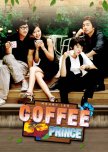
I'll give it to the writer of Coffee Prince for being able to deal with the topic of homsexuality in such a refreshing manner - especially when one considers how touchy Koreans are about the topic. Choi Han Gyul's struggle was believable and was dealt with much tact. The free and relaxed intimacy between the couples was commendable as well. However, there wasn't much going for the drama plot and execution wise.
The acting was hit or miss. It started off pretty decent, but even Gong Yoo's performance seemed lacklustre by the end of the whole parade. Yoon Eun Hye was clearly worse than she was in Goong, and asides from her crying scenes, she came across as incredibly concious of everything. I generally preferred watching the supporting cast as their performances were small doses of natural entertainment.
As with all shows about females who disguise themselves as males, one has to suspend an element of disbelief and just go with the flow when it comes to believing that Yoon Eun Hye could actually pass for a 24 year old male (she looked more like a pre-pubesecent elementary school boy if you ask me). So, I'm not going to criticise Coffee Prince for such a far-fetched premise; although, I would have much preferred for the big reveal to happen earlier rather than as late as it did, but more on that later.
My primary problem with the show was how the relationship and feelings between the leads developed and progressed. It was clear that Choi Han Gyul was totally, madly, selflessly in love with Go Eun Chan, but I never got the same vibe from Eun Chan herself. I understand that it is difficult to tell someone "Oh, hey, by the way I'm a girl" when they've thought you were a guy for several months, but Eun Chan's refusal to tell Han Gyul she was a girl went on for too long and her reasoning behind not telling him was selfish and self-serving. Her behaviour was unreasonably deceptive and she did nothing to ease Han Gyul's distress, everything she did was for herself and for no one else. It was difficult to believe that she actually loved Han Gyul when she continued to behave in a selfish manner after they were going steady. I get that she's poor and wants to prove her independence, but she never actually gave anything to the relationship and kept leaving Han Gyul hanging. The same thing goes for the other couple in this drama.
The second major flaw of the drama was how easily the men could be reduced to puddles of absolutely worthless misery. ALL of them were incapictated and emsaculated by the women who had them wrapped around their little fingers. Not one of them ever had a relatioship of mutual understanding with the woman that they loved. It was unbearable to watch such an unrealistic and exaggerated portrayal of male love.
Thirdly, the drama was meaninglessly long. I came to love for the fast-forward button on my remote control during the last 6 episodes. Needless exposition, supporting character story arcs that never developed and repetitive scenes where a change in scenery was the only difference all led up to an essentially fruitless finale. What was the point in having a two year time skip if the characters remained in exactly the same position as they had before? (Save for a few.)
I know that many people - especially women - will love this drama, and I can understand why it's considered a K-Drama classic because it has the makings of one (cliché + cliché + timeskip = classic), but I didn't like it as much as I liked other classics such as Goong. In my opinion, Coffee Prince is totally worth skipping. If you want a cross-dressing, reverse harem drama that is a whole lot of fun go you're better off watching Sungkyunkwan Scandal.
Questa recensione ti è stata utile?
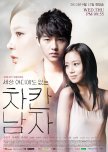
(Beware though, because the whole Jae Hee/Ma Ru fiasco might just drive you nuts, and the ending is ever so slightly disappointing.)
However, whilst Innocent Man appears to be an external drama - with the plot affecting the characters - at its core it's an intensely internal drama. Typical outward gestures are turned on their heads because the audience doesn't actually know if these outward gestures are sincere are not. This is especially the case with Kang Ma Ru - whose own personal struggles make it difficult for him to even realise his own sincerity. It is definitely incredibly difficult to discern whether one should be rooting for him or not which causes huge amount of internal conflict and drama. I guess that's part of the reason why Innocent Man is so good - the internal and external conflict bounce off of each other, with plot driving the characters and vice versa.
The main highlight of the drama was definitely the cast. We've got three very brilliantly written, troubled and complicated characters. A fail performance could ruin them. But that didn't happen; instead we got nuanced performances from all three actors who convincingly portrayed the highs and lows of these multi-faceted characters.
However, special mention goes to SONG JOONG KI who was absolutely - excuse my foul language - fucking fantastic as the engima that is Kang Ma Ru. His performance never faltered. Song managed to captivate Kang Ma Ru's character development in way that is just unimaginably perfect. He IS Kang Ma Ru the naive genius who is head-over-heels in love with his noona. He IS Kang Ma Ru the tortured, embittered and selfish player who'll do anything for revenge. Song doesn't even need to speak to convey the emotions or state of thought that Ma Ru is in - one can just see it if they are to look into his eyes. I can't even imagine any other actor being able to successfully play a role as complex as Kang Ma Ru (who is a genius that actually feels like a genius throughout the whole show, although that has more to do with the skill of the writer rather than the actor. But, then again, SJK is a genius himself). It's probably a career defining performance for Song Joong Ki.
Innocent Man is a polished and sophisticated drama that draws you in with its unpredicatable, fast-paced and addictive plot. The leads may messed up to the highest degrees, but they're compelling and human - the performances successfully captivate the sheer complexity of the characters, allowing the audience to believe that such people could exist in real life (no matter how unrealistic their situations are).
P.S. I watched Innocent Man in one sitting. Me, who never misses sleep, missed sleep for this and boy do I have no regrets.
Questa recensione ti è stata utile?
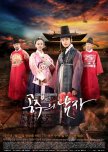
I was expecting weepy melodrama due to it supposedly being modelled on ‘Romeo & Juliet’; however, ‘The Princess’ Man’ served up a lyrical romance, fierce conflict, an intricate and detailed plot and perfectly constructed three-dimensional characters that never failed to show growth or depth.
The romance and political intrigue were two sides of the same coin: the power-hungry Grand Prince Sooyang’ daughter (Lee Se Ryung) falls in love with his just mortal enemy’s (Kim Jong Seo) son (Kim Seung Yoo). Se Ryung struggles with the love for her Father and her moral alignments - which align with that of her father’s enemy - whilst the latter is caught between his love for Se Ryung and his strong desire to kill her father. Neither is unaware of the grave brevity of the situation that they are in. Se Ryung is no love-struck child, but a woman who knows the difference between right and wrong and (initially) attempts to resolve the lover for her father with the love for her man. Love and politics are inextricably linked to one another, which prevents the intrigue in the The Princess’ Man from wearing thin as it is impossible to think of a way the two star-crossed lovers can resolve the political tragedies that greatly hinder their chances to be with one another - thus making the drama even more compelling.
The intrigue doesn't simply act as a backdrop for Se Ryung and Seung Yoo’s love, but it is equally as compelling (at some moments, it is even more exciting) as the romance. The discord is wholly understandable and its impact is hellish. Lives are being torn apart, families are being broken and then restructured, friendships are being betrayed but not fully abandoned. Episodes zip by with major developments and revelations that leave you pressing the button for the next episode. Nothing disappoints and everything has an impact.
One’s heart will be left with a deep impression by this poetic and tragic drama that all should watch.
Questa recensione ti è stata utile?
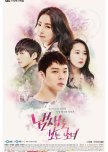
The Girl Who Sees Scents
9 persone hanno trovato utile questa recensione
There's all so much stupidity I can take in a drama,before it all becomes too much and starts to have an actual affect on my brain. TGWSS was never the most clever of stories, with its presentation of wholly incompetent cops who spent more time eating than trying to catch a serial killer, but I forgave it - for a short time - for being able to work its way around the laughable police work in favour of exploiting our heroines smelly eye. However, once we hit episode eleven, the contagious disease of stupidity seemed to have spread to our heroine, herself, who became both a Noble Idiot and a Complete Idiot. From then on out we can see a continued series of events where characters decide to confront known murderers and get in murderers' cars. Even the intelligent and bitching Lieutenant falls victim of the strain of stupidity that seems to plague the innocent characters of Smelly Girl.
The heaps of plot induced stupidity that riddled Smelly Girl is a clear sign of poor and undirected writing in an attempt to make enough story for a 16 episode drama. Smelly Girl was a brainless plot that was far too long; ten episodes, max, is all it needed to set up the murders, investigate, romance, and catch the killer. There was absolutely no need to throw in some sacrificial lambs to ruin a perfectly healthy relationship in order to drag out an already thin enough piece of string.
I was only half watching by episode 13, and by episode 14 I started skipping a ridiculous amount of scenes so the damn story would actually *go somewhere*. It wasn't until episode 15 that I become interested, once a more, before I promptly switched off all concentration and fell asleep.
The only possible saving grace of Smelly Girl was the romance which could have been perfect - emphasis on the could - if only the writer had left it to blossom, instead of unfairly cutting it off because the heroine felt 'guilty' for a totally nonsensical reason. I absolutely hate Noble Idiots/Sacrifical Lambs, but I hate them even more when the reason for their behaviour is absolutely pathetic (not that Noble Idiocy can ever be justified). It was so frustrating to see the heroine making the decisions on her own and taking the hero's right of agency away from him even when he said her guilt did not matter. She became unbearably thick, so thick that I thought someone would have to beat the goddamn message into her.
If you value your brain cells I strongly recommend that you stay as far away as possible from 'The Girl Who Sees Scents'. Don't be fooled by its snazzy premise and cute OTP, because that all goes down the gutter in favour of general foolishness.
NB. If I was a cop in S. Korea, I would be highly offended by how absolutely useless the police force is portrayed.
Questa recensione ti è stata utile?

Questa recensione può contenere spoiler
Writing takes a nosedive after episode 6
Wow. Kim Sae Ron's DUI truly destroyed the momentum the show had built up and they did NOT stick the landing. What started off as simple, yet focused, story meandered into a laughable mess. Bringing in Siwon to serve a major role in the climax was a huge mistake. His presence earlier on the story did not warrant the role he played later on. And the other female character? The definition of deus ex machina. The production should have just bit the bullet and kept Kim Sae Ron for the last two episodes. Her role was just too significant to have been written out in that manner, and it didn't align with her character's values to fuck off to the Rome.The cast and action sequences are really what made the drama stand out. The writing was, initially, much better than your usual K-Drama fare and didn't rely on any of the tired tropes we see in crime-thriller K-Dramas. It felt more cinematic in its nature. But the characters behaved so stupid, at times, that it just felt silly. Hyeon-ju, Gun-woo, and Woo-jin making bad decisions wasn't nearly as bad as seeing President Choi and his knifers make such obvious blunders. Those two knifers had death flags the minute they appeared on screen, but I wish their deaths hadn't been so stupid. You're a VETERAN in the business yet you're not covering your tracks when going against a HUGE gang? Dumb. The ending just emphasised everything that was wrong with the writing prior to the concluding episodes.
Should have been a BL btw. Gay subtext was crazy lol.
Questa recensione ti è stata utile?
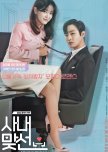
Almost, but not quite there
This was so close to being a perfect drama: the comedy was funny, the acting was good, and the story moved at a really good pace. The relationship between the leads may have begun as contrived, but the development was genuine with the chemistry being off the walls good. The same goes for the second couple too. Where things fell flat, however, is after episode 7. The conflict was annoying and made the story stagnate. The grandfather behaved too out of character, and I felt the focus on his disapproval of the relationship took away from more development from the two couples. I would have liked to have seen some weddings and a happy-ever-after, instead of watching several episodes of the Grandpa's meddling. Overall, it was a good drama, and the writers did manage to stick the landing despite their meandering near the third act.Questa recensione ti è stata utile?
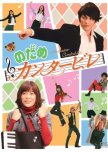
I really appreciated how the dramas conflict wasn't based on "good" vs "evil", but was an intrinsic battle that Chiaki himself had to overcome. Chiaki isn't just critical of those around him, but he's also highly critical himself which prevents him from being able to form valuable relationships with people and thus understand music better. Nodame is the person that challenges this struggle of Chiaki's and helps him - unbeknowst to him - to discover a vast capacity to love people (as well as to overcome his fear of flying). Here we have a mistmatched pair who are able to understand each other and help the other to grow.
The romance might not be in your face, but the subtlety is a thousands times more touching. The way Chiaki is so deeply affected by what Nodame says, does and plays shows that a beautiful sort of love his forming. He might not realise how he feels, but the audience is able to clearly ascertain that there's more to his feelings than a massive appreciation for how Nodame plays the piano.
Speaking of subtlety, I really love how character development is portrayed in NC: its poignant, subtle, and unexpected. It is isn't simply expressed through words, but through actions and - most importantly - through music. Music is a vital part of our lives. It is the one thing that is able touch people's hearts and bring people from all walks of live together. 'Nodame Cantabile' is able to capture the profound affect that music has on its characters lives as we see a character letting go of all of their inhibitons and becoming one with the music. This is most prominent with Chiaki - the tension in his shoulders seems to disspitate when he lets himself become one with the music and his orchestra during the last episode. He's relaxed, free and loving every minute of what he's doing. Being able to portray all of that without words takes both great directing and great acting.
Most people talk about Ueno Juri's portrayal of Nodame when NC is mentioned, but I think that Tamaki Hiroshi is the real star of the show. His performance of Chiaki is so sensitive that I can feel Chiaki growing up and learning how to love more vividly through the way he plays with intonation, his eye expressions, the way his body moves with passion whilst conducting and the small smile that plays around the corners of his mouth. The connection Tamaki Hiroshi has with Chiaki's character is so compelling, I really can't imagine anyone else playing Chiaki. I look forward to watching more of Tamaki's work.
For one to fully enjoy 'Nodame Cantabile' one has to overlook the slightly too anime-like execution of this drama. The humour is what prevents the story from gaining that perfect 10 - it offsets the tone of the drama due to its overly whacky and slapstick nature. I guess its part of the dramas charm, but I would have personally preferred it in smaller doses. The most aggravating part of the humour was the violent tendencies that Chiaki had towards; punching and throwing really ain't cute, and it did leave a bad taste in mouth.
All in all, 'Nodame Cantabile' has become a firm a favourite. It's beautiful, poignant and charming, and despite its silliness it manages to convey a touching message about love and music. The finale will leave you swelling the absolute grandure of Beethoven's Symphony No.7 as well as the overwhelming amount of emotion that managed to be conveyed through barely any dialogoue in the last 15 minutes. It's definitely one to watch and should not be skipped!
Questa recensione ti è stata utile?
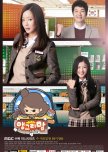
'Angry Mom' also suffered when it came to setting the tone; the drama was verging on being dark and melodramatic to being slapstick funny, the show didn't actually set its tone until we reached the halfway point. Less patient viewers would have probably have already dropped the show by then as the messed up tone made AM feel like it didn't have any sense of direction, and it actually became quite boring during episodes 6, 7 and 8.
I didn't actually get a feel for the show until the second half of the drama, which, although not perfect, was defintely the best part of the whole show. The tone was solid, the twists were genuinely surprising, the pacing was swift and the tension was rife. It kept me on my seat, and I didn't feel the need to fast forward any of the scenes in order to make the 70 minutes go by faster.
Alas, the first half of the show was an utter bore and suffered from too many problems to make it earn a score higher than 5.0.
It was fun watch during the second half, but 'Angry Mom' really isn't anything special. If you want a good high school drama, skip this, and watch Shut Up! Flower Boy Band instead.
NB: Dear Angry Mom,
Thank you for introducing me to the perfectly adorable Ji Soo. I am utterly grateful.
- akisame
Questa recensione ti è stata utile?
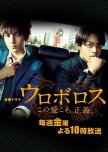
Ouroboros' main problems lie within its unoriginal story and how said story is executed. I'm not saying that is a bad thing because plenty of stories are unoriginal, story writing thrives on borrowing elements and themes from one another, but its how these unoriginal stories are tackled that is what makes them original. Do I make sense? (I probably don't because I'm an insomniac, and my brain is muddled due to lack of sleep). I digress - my point was, Ouroboros doesn't do anything different with its story to make it original. Most of the major plot twists can be seen from a mile off and have been seen before. It makes the scriptwriting seem a bit lazy and contrived, because an intelligent viewer has already figured out something major before the characters had. There are also lot of plot holes. They aren't exactly massive, but they're important enough to be detrimental to the score of the drama. After you watch Ouroboros you'll probably be sitting there wondering why so and so's backstory wasn't properly explored before they popped on screen, or what happened to so and so after so and so was killed. The villain of the week type structure that the writers were trying to maintain for the first 4-5 episodes, whilst attempting an overarching storyline, is what contributed to the problems in plot. There's also a massive sense of inevitability from the outset of the drama.
However, despite my criticisms of the predictable nature of the drama, I do commend the writers for managing to keep the MAIN major plot twist unpredictable. I did really go WTF when the BIG big reveal was revealed, and when the drama ended. And as I said before, whilst there is a massive sense of inevitability from the beginning of the drama, the ending will genuinely have you sitting in shock for a couple of seconds (maybe more of you're a more sensitive viewer).
Whilst the story might not be particularly innovative, the characters sure are. Ryuuzaki and Danno are not your typical one-dimensional revenge drama male leads. Both believed they had gone off the righteous path a long time ago, when they were really still struggling between right and wrong. Ryuuzaki found it difficult to fight between his desire to avenge the only mother-figure he'd ever known or just forget his vengeance and move on with his life with a woman who cared for him. Danno - who just seemed like a ruthless, yet intelligent, yakuza - who didn't want anyone to see the real him and was still holding on to the love he had as a child and was willing to sacrifice himself for another's happiness. Whilst the two did do quite immoral things and sold themselves as dishonest men, the trajectory they went through for redemption - and eventual happiness - was befitting and highlighted their essentially child-like souls. I also think that the two had one of the sweetest and endearing bromances as well. The two characters were also played wonderfully with great nuanced performances by Ikuta Toma and Oguri Shun - who had a great dynamic with each other.
Inspector Hibino was also a beautifully sincere and resilient character who learnt that forgiveness can be more important than justice when it comes to the people you hold near to you. Although she went through a lot of pain during Ouroboros' run, her trajectory made her grow as a person and see the world in a wider sense so you just knew that her scars will heal and she'll come back even better. Ueno Juri played her so wonderfully that I forgot she's the same actress who played Nodame - she really became Hibino Mizuki.
The supporting characters were also great and there wasn't a single character or performance I disliked. The villain, though, was a bit eh but otherwise the rest of the cast managed to hold their ground and deliver nuanced performances despite the three leads being at such a magnanimous level of talent.
At its heart, Ouroboros is essentially a character study which redeems the somewhat lacklustre plot since the characters in Ouroboros are so relateable and are backed up by an excellent cast. Don't watch Ouroboros if you're hoping for something that breaks the mould in the revenge genre, but watch it because you'll be moved by each characters trajectory and the realness of their suffering.
Questa recensione ti è stata utile?
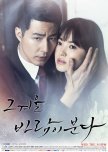
That Winter, The Wind Blows
5 persone hanno trovato utile questa recensione
Whilst it certainly started off well - with the first 5 to 6 episodes being good - TWTWB eventually ran out of steam before it even hit the halfway mark, turning into a limp, thinly spread out drama with glaringly obvious plot holes that were almost migraine-inducing. Just when you think that the plot is heading somewhere interesting, the writer goes and fucks everything up making you feel like you've been had. I found it to be a major insult to my intelligence when The Big Reveal was finally revealed after being dragged on for what felt like a milllennium. What was revealed was already known by the audience RIGHT FROM THE BEGINNING, and after that nothing much happened. There was no explanation of the characters' motives and neither was there a satisfying story of redemption (or failed redemption). Instead, all we got was needless exposition and lots of angst. Which meant I wasted 16 bloody hours on a weeping mess. A weeping mess that wasn't even fun to watch. And what was with that totally deceitful and illogical ending that totally disrupted the tone of the show? I could forgive the ending in Innocent Man because the whole show had been the total opposite of TWTWB and it was what I wanted to see, and was totally deserved, despite the execution being rather iffy, but the ending in TWTWB was just farcical. Don't even get me started on that creepy as fuck faux-incest either. I'm still trying to wipe that out of my head.
Sometimes a weak plot can be saved if the characters are relatable. However, TWTWB's writer seems to have failed on all fronts because all of the characters were flat as a cardboard cut-out and failed to ignite any sympathy from me. The only one who was remotely interesting was Hee Sun, otherwise I couldn't have cared less about what happened to the rest of them. Oh Young was the one I hated the most - she started off as selfish and conceited, and she ended as selfish as conceited. She also talked too much, way too much, and most of what she had to say was repetitive, superficial and incredibly vapid. But at the end of the day, her character progression was like all of the others: it simply did not exist. How the two leads ended up falling in love with each other is simply beyond me, but I guess toxic attracts toxic
I've seen a lot of praise in regards to the acting, namely the performances provided by Jo In Sung and Song Hye Kyo. Honestly, while these two were quite good - and I use the word in the prespective sense - their performances suffered during the latter parts of the drama. Jo In Sung's tendency to overact when it comes to more emotionally powerful scenes is cringeworthy and Song Hye Kyo's face eventually came to resemble that of a dead fish. OK, I get it, she's blind, but that doesn't hinder her ability to look like a human being on screen. You can tell these two became tired by their performances, but who can blame them when their characters were so pathetic to begin with?
That Winter, The Wind Blows decides to threw logic out of the window in favour of a highly stylised drama that lacks both a proper storyline and depth. It's plot induced stupidity is an insult to intelligence and its characters are some of the most insufferable people to date. If I hadn't enjoyed the first 6 episodes,TWTDB wouldn't have scored more than a 2. If you like to be respected as a viewer, avoid it all costs - and I mean ALL.
Questa recensione ti è stata utile?
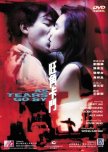
The Beginnings of an Auteur
Its very weird watching As Tears Go By after seeing Wong Kar Wai's later works. His directorial style is very much in its infancy here: saturated colours, slow motion fight and chase scenes, shooting in the dark -- contrasted against more orthodox forms of camerawork.The story itself is much more traditional. Being in the mind of the characters' takes a backseat to a formulaic plot about street gangsters. The ending is clear before we've even hit the halfway mark. But its set apart from the others because of its atmospheric love story.
What shines most here is the romantic atmosphere that Wong creates. And I don't mean between Andy Lau and Maggie Cheung (who are playing first cousins, ick). Its the passionate devotion between Andy Lau's Wah and Jacky Cheung's Fly that's the heart and soul of this film. Both men want the other to live a good life. To be safe, happy, and thrive. Their push and pull is painful to watch. They're like magnets and it makes sense that one cannot truly live without the other.
I absolutely adore Maggie Cheung - she's talented, gorgeous, and commands the screen. But she has very little to work with and is probably the thinnest of the characters in this film. Ngor suffers from being nothing but a love interest. Forgotten by the plot and her man, unless its convenient, and ultimately one of the most forgettable of Wong's female characters. If I had watched this film first, instead of In The Mood for Love, I might never have continued with Wong's filmography as I would have thought he's just terrible at writing women.
I'm glad I watched this -- even if it was just to see where Wong started and how he evolved for the better.
*copy and pasted from my Letterboxd review*
Questa recensione ti è stata utile?
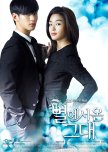
You Who Came from the Stars
3 persone hanno trovato utile questa recensione
The dialogue was sharp and witty when it needed to be, and touching when it needed to be. It set the tone right, unlike most other romantic dramas (which later fall into the melodramatic category). I'll admit that it became a bit of a melodrama during the final two episodes; however, it never completely fell into the weepy melodrama that I was expecting it to and it retained the majority of its comedic charm throughout its run. I also admire how the romance never fell flat and that the leads didn't play a long match of love ping-pong with each other.
However, the two story lines that were running concurrently against each other didn't feel united. Yes, the characters were linked to one another, but the murder mystery didn't quite sit well with the romantic developments. Cheon Song Yi was so far removed from the whole murder intrigue and when she was involved she was simply being used as a pawn during the villain's evil machinations.
The story would have been so much more cohesive if Song Yi was sleuthing with Do Min Joon and Lee Hwi Kyeong, instead of just watching a suspicious video of a dead girl with a woman who is obviously very scared and not thinking much of it.
Because the two story lines failed to develop and link with each other, the drama felt unnecessarily dragged out to me. And whilst the two second main leads certainly weren't the most annoying 2nd main leads in drama history, they just turned out to be vapid and lacking in development. Yeah, Hwi Kyeong was nice and was brave to stand up against his brother, but that's all he really was. I didn't see much of point in Yoo Se Mi's character...she didn't really make you feel anything towards her - she was just there.
But the drama did present a believable romance. Although Cheon Seong Yi bears a strong resemblance to the young girl that Do Min Joon saved 400 years ago, that it isn't why he falls in love with her. Yes, he's interested in her because of that resemblance - both that interest is just sheer curiosity. He falls in love with her imperfections: she might be blunt, hot-tempered, and a bit crazy, but it doesn't matter to him. He loves her. And she loves him. Also, I am very glad that it was never a one-sided love story!
Finally, Jeon Ji Hyun shines so brightly in this drama. I really can't imagine a 3-dimensional character like Cheon Seong Yi being portrayed by anyone other than Jeon Ji Hyun. I know most of the surrounding hype in regards to YWCFTS was centered around Kim Soo Hyun, but this drama was really made by JJH. It wouldn't have had the same attraction if she wasn't the main. KHS is not a bad actor, but he has the tendency to be wooden and I don't believe he has established the same amount as screen presence as JJH has.
Questa recensione ti è stata utile?

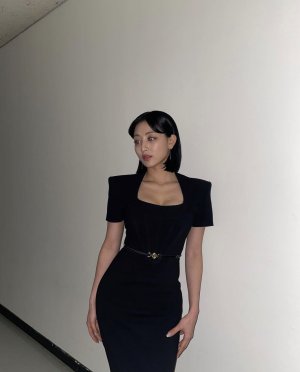
 2
2




















